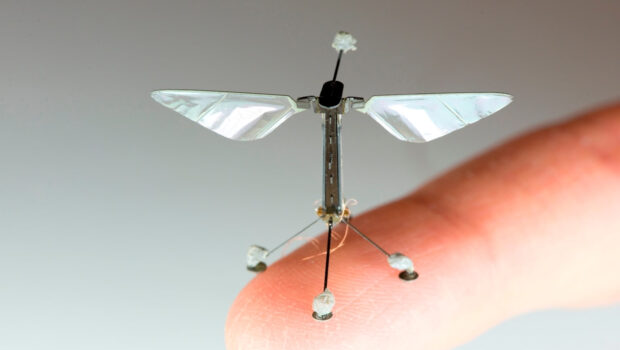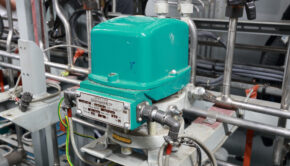Robot Bees – Can it become a reality?
Bees are important for plants to grow. They help plants make fruits, vegetables, nuts, and seeds – things we like to eat. Bees also help make sure there are lots of different plants growing. This is important so that other animals can eat, too. But bees are having a hard time. There are many things that are making it difficult for them to live. This is not good because it could make it harder for us to get the food we like.
We need to help bees so that they can keep doing their job. We can do this by not using things that are bad for bees, like pesticides. We can also help by making sure there are places for bees to live and making gardens that bees like. It is also important to tell other people about bees and how they need help. But these are solutions we humans rarely give an F about. But perhaps there is a solution to this if we ever find ourselves in a world where bees are rare. Yes, my friend, more bees, but mechanical style. Now, for the people who never watched Black Mirror, let me explain what I’m talking about.
In the “Hated in the Nation” episode of Black Mirror, a mysterious figure starts targeting people with a swarm of robotic bees that can enter the human body and kill them. The bees were originally created to replace real bees that had gone extinct but were then hacked and reprogrammed to be used as weapons. A detective and a hacker work together to try to stop the attacks before more people die. They eventually discover that the hacker responsible for the attacks was actually a victim of online bullying who was seeking revenge. The episode explores themes of the dangers of social media and the consequences of online harassment. But, we are obviously not interested in that last bit (when were we?), we are more interested in the mechanical bee replacement part
Mechanical bees – A future we don’t want, but we may need

Now, talking about the bees, the bee population is decreasing for a variety of reasons. One major factor is the use of pesticides and other chemicals in agriculture. These chemicals can harm bees’ immune systems, making them more vulnerable to disease, and can also damage the plants that bees rely on for food. Climate change is another issue, as it can affect the timing of plant blooms and disrupt bees’ natural patterns. Habitat loss is also a problem, as bees need diverse and healthy environments to thrive.
Finally, parasites and diseases are a major threat to bee populations, as they can spread quickly and decimate entire hives. It is important to address these issues and take action to protect bees, as they are crucial for the health of our ecosystems and our food supply. And we don’t have a solution to all these because of how arrogant we are as humans that don’t want to give up on pesticides and practices, that kill the bees.
Now, what are mechanical bees you might ask? The basic description of Mechanical bees is artificial bees that are designed to replicate the functions of real bees. They would be programmed to pollinate plants and perform other tasks that bees do but without the risks associated with pesticides or other threats to bee populations.
An institution is already working on creating small flying robots, that match the basic description of robot bees. And they named the project RoboBees, so I guess it’s more of a direct approach than being inspired by bees. They are working on achieving three things: the Body, Brain, and Colony. Body development consists of constructing robotic insects able to fly on their own with the help of a compact and seamlessly integrated power source; brain development is concerned with “smart” sensors and control electronics that mimic the eyes and antennae of a bee, and can sense and respond dynamically to the environment; the Colony’s focus is about coordinating the behavior of many independent robots so they act as an effective unit.
The Wyss team at Harvard wants to make this a reality and they already made prototypes that are quite astonishing.
RoboBees design and engineering challenges – Trying to play force of nature

The RoboBees project at Harvard faces several design and engineering challenges in creating robotic bees that can replicate the functions of real bees. One major challenge is creating a power source that is compact and seamlessly integrated into the robotic insects, allowing them to fly on their own. Another challenge is developing “smart” sensors and control electronics that can mimic the eyes and antennae of a bee, and sense and respond dynamically to the environment. Coordinating the behavior of many independent robots so that they act as an effective unit is also a significant challenge for the project. The team at Harvard is working on addressing these challenges and has already made prototypes of the RoboBees that show promise in achieving the project’s goals.
One of the major concerns with the development of robot bees is that they may not be able to fully replicate the functions of real bees. Real bees have evolved over millions of years to play a crucial role in pollination and the health of ecosystems. Robot bees, on the other hand, would be a man-made creation that may not be able to fully replace the ecological functions of real bees. Additionally, the use of robot bees could lead to unintended consequences that we cannot predict, such as changes in the behavior of other pollinators or disruptions to the balance of ecosystems. Furthermore, if the robot bees were to malfunction or be hacked, they could pose a threat to other organisms in the environment. Therefore, it is important to carefully consider the potential risks and benefits of using robot bees before implementing them on a large scale.
What do we expect, and if we do, from mechanical bees

Robot bees can’t produce honey that’s for sure, but many of the honey-based products are synthetic anyways. And honey is not why bees are important. But, should we really expect to duct tape things with artificial patches for the things we destroyed because of greed and overconsumption?
Human greed, overconsumption, and disregard for the environment are leading to the destruction of our planet. We are polluting our air, water, and soil with toxic chemicals, causing irreversible damage to ecosystems and endangering the health of humans and wildlife. We are overfishing our oceans, driving many species to the brink of extinction. We are cutting down forests and destroying natural habitats, leading to the loss of biodiversity and the displacement of indigenous communities.
We are also contributing to climate change through our reliance on fossil fuels and unsustainable practices, which are causing sea levels to rise, temperatures to increase, and extreme weather events to become more frequent and severe. It is essential that we take action to address these issues and protect our planet for future generations. But instead, we are duct-taping solutions so we don’t have to stop greed and overconsumption.
Conclusion
In conclusion, the decline of bee populations is a serious issue that needs to be addressed in order to protect the health of our ecosystems and our food supply. While mechanical bees may seem like a solution, they come with their own set of challenges and potential risks. The best solution is to address the root causes of the decline, such as the use of pesticides, habitat loss, and climate change, and take action to protect bee populations. This requires a shift in our mindset and practices as humans, away from greed and overconsumption, and towards sustainability and environmental stewardship. We must act now to protect our planet and ensure a healthy future for all.






![The Most Popular Olympic Events [Infographic]](https://technofaq.org/wp-content/uploads/2016/08/olympic-infographic-full-150x150.png)



![Writing the Perfect Guest Post Pitch [Infographic]](https://technofaq.org/wp-content/uploads/2019/02/How-to-write-perfect-guest-post-pitch-150x150.jpg)




